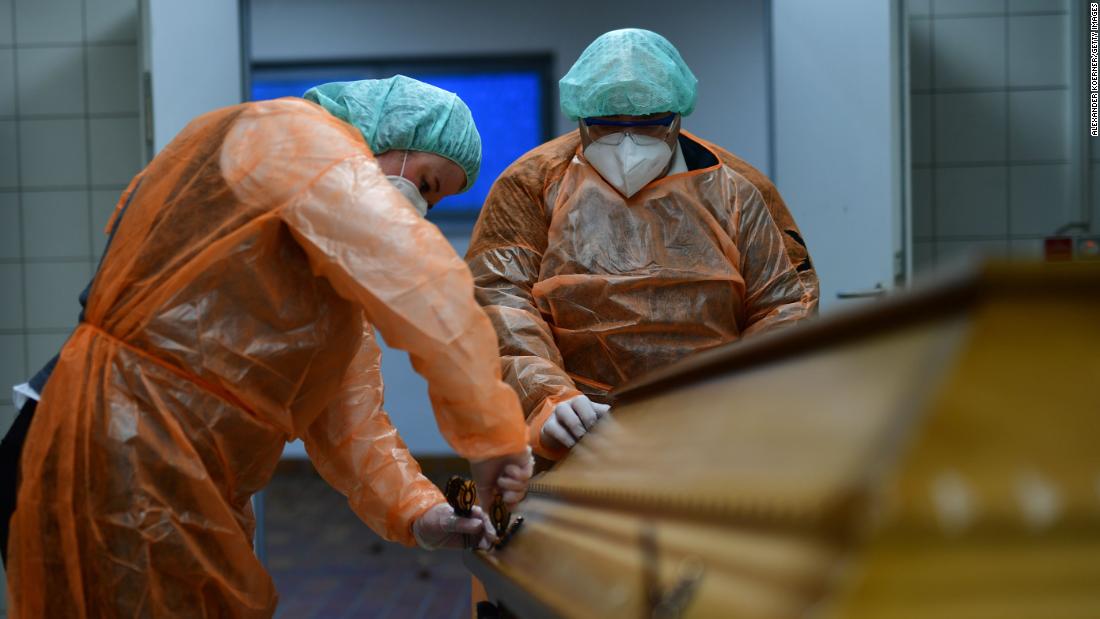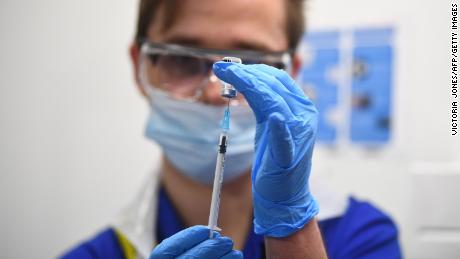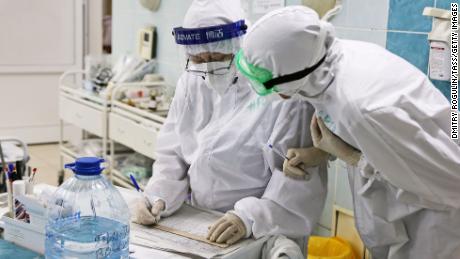Health experts warn drastic action is needed as Covid tears through the region, again
Russia and Germany reported record daily Covid-19 deaths on Friday, and October was Russia’s deadliest month in a decade. Stockholm’s intensive care units hit 99% capacity as Sweden proposed a spring “pandemic law” to potentially force closures of certain public spaces. And France said its lockdown would not be eased as planned on Tuesday after daily case numbers rose on Thursday compared with last week.
Germany tallied 598 fatalities in a span of 24 hours, according to the country’s center for disease control, the Robert Koch Institute.
The nation also added a record 29,875 new infections on Friday, roughly 6,000 more than the day before.
Despite the country’s much-vaunted health system and success in containing the virus earlier in the pandemic, its recent partial lockdown has failed to stop the second-wave surge.
“Germany clearly is very worried and you can see their numbers are absolutely going in the wrong direction,” Linda Bauld, professor of public health at the University of Edinburgh, told CNN.
She said that was probably down to fewer restrictions and “the fact that their testing and tracing system has been under real strain.”
Bauld said countries such as Spain and France had made some progress thanks to recent lockdowns, but while the UK had taken some steps forward, areas including Wales were moving backwards.
“In a number of parts of Europe, there have been restrictions that are now being loosened, and when they get loosened, people really take advantage of that and that’s exactly what’s happened in Wales,” she added. “It’s just human behavior.
“I think January is going to be really difficult, and probably February as well.”
High stakes
UK Health Secretary Matt Hancock warned on Thursday that the number of Covid-19 cases was rising again in some regions after flattening in recent weeks in the wake of England’s November lockdown. The UK is averaging 16,000 new cases a day, a higher number than last week.
Hancock said in a daily briefing that he was “particularly worried” about the number of cases in London and nearby Kent and Essex. In London, schoolchildren aged 11-18 account for the most cases while the rate in adults is “broadly flat,” he said.
To combat the rise while keeping schools open, mass testing is to be offered to all children in that age group in the worst-affected parts of these regions.
London had the highest prevalence of Covid-19 in England in the week to December 6, fueling speculation that restrictions in the city could be tightened on December 16 when the government will review regional tiers. This would mean pubs and restaurants being forced to close.
The UK recorded 20,964 new coronavirus infections on Thursday, a rise of almost 5,000 in the previous 24 hours, and 516 deaths. It brings the case count to almost 1.8 million and the death toll to 63,082.
“People just really need to understand what the stakes are and that most of these deaths will be avoidable if we can just hold on a bit longer,” Jennifer Dowd, associate professor of demography and population health at University of Oxford, told CNN.
“I really want people to hunker down and I know that it’s a big sacrifice for us to stay away from our loved ones and our friends but I think the fact that we can see the end point now is really exciting.”
France has decided the easing of restrictions scheduled for December 15 will not happen in the light of recent Covid-19 infection figures, French Prime Minister Jean Castex said at a news conference on Thursday.
“On December 15, we will move to a new stage, but the rules will be stricter than what we had envisioned,” Castex told reporters, adding that the target of 5,000 new cases per day — which President Emmanuel Macron had set as a precondition to lifting the lockdown — would not be met by that date.
Health Minister Olivier Véran reported about 14,000 new coronavirus infections on Thursday, compared to 12,000 last Thursday, warning that cases could rise with low winter temperatures and holiday gatherings.
Cultural venues including theaters and museums that were due to reopen on December 15 will remain closed for three more weeks, Castex said.
France’s 9 p.m. to 6 a.m. curfew will be extended to 8 p.m. to 6 a.m., the Prime Minister added. One exception to that restriction will be made on Christmas Eve.
However, French citizens will not need certificates to leave their homes from December 15 and they will be allowed to travel to other regions. Restaurants and cafés are still scheduled to reopen on January 20.
Castex emphasized that the country’s health situation had “considerably improved in recent weeks” but that improvement had slowed in the past few days.
Record deaths and hospitals in peril
Russia also reported its highest ever single-day death toll with 613 deaths on Friday, according to data published by the country’s coronavirus task force.
It reported 28,585 new cases, bringing its total to 2,597,711 cases with 45,893 deaths. CNN and other media previously reported that Russia’s counting method of coronavirus fatalities has been questioned by independent observers and the real toll could be much higher.
Russian statistics agency Rosstat on Thursday published mortality figures for October, which suggested almost 23,000 deaths were linked to coronavirus that month. The task force, which provides daily figures on new cases and fatalities, reported only 7,344 cases that month.
Rosstat has recorded roughly 164,000 excess deaths in Russia between April and October compared to the same period in 2019.
The agency also reported more than 205,000 deaths in October, making it the deadliest month in a decade.
The Swedish government — which famously opted not to lock down during Europe’s first wave of the pandemic — wants to introduce a temporary “pandemic law” in the spring that would give it powers to potentially force closures of certain public spaces, as health officials said 99% of intensive care beds in Stockholm were full.
Social Affairs Minister Lena Hallengren and Minister of Culture Amanda Lind said Wednesday that the proposed law, if passed by parliament, could take effect on March 15.
“We are currently in a serious situation and we need help,” Stockholm’s Health Director Bjorn Eriksson told a news conference Wednesday.
Speaking to CNN on Thursday, Eriksson said a shortage of healthcare workers has prompted conversations with private providers “to see if we can get reinforcements so that the care staff at our hospitals have time for recovery.”
He said that as of Thursday morning, “our hospitals had 10-12 intensive care units available and at the same time we are opening up more intensive care units; so the situation is constantly changing.”
He added that coronavirus patients also had access to “intermediate care, which is something in between a regular inpatient care and an intensive care unit,” which helps take the pressure off ICUs.
Now the vaccine rollout has started in Europe, there is hope, but Dowd says people need to make a final push to prevent unnecessary deaths.
“I think if we can we somehow psychologically get there to think, let’s sort of hibernate for the winter,” she said. “And when we wake up in March and April, things will be a lot better.”
CNN’s Fred Pleitgen, Claudia Otto, Sandrine Amiel, Lindsay Isaac, Robyn Kriel and Schams Elwazer contributed reporting.
![]()








